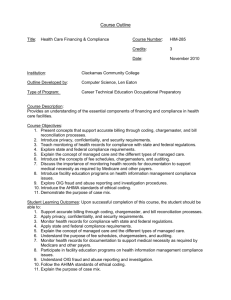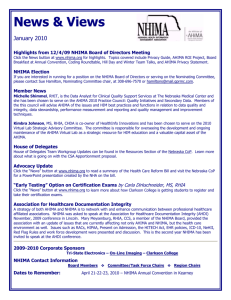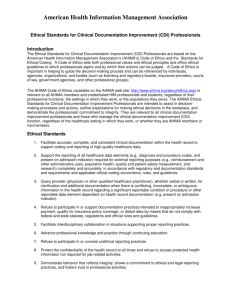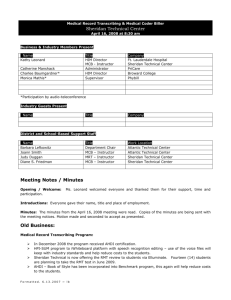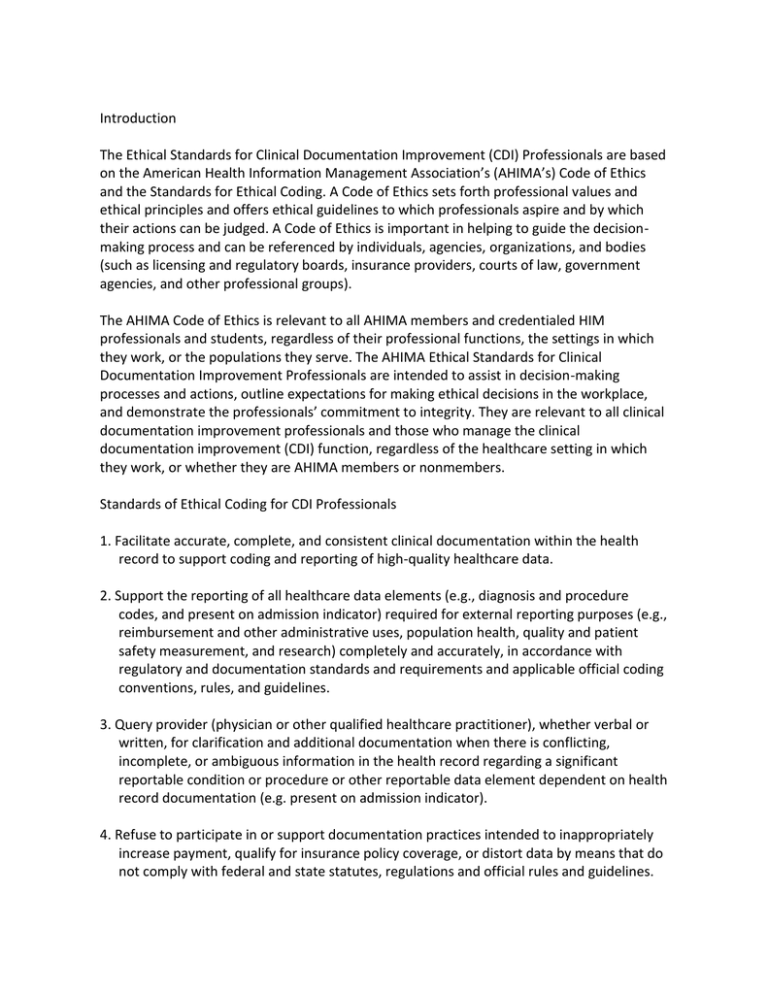
Introduction
The Ethical Standards for Clinical Documentation Improvement (CDI) Professionals are based
on the American Health Information Management Association’s (AHIMA’s) Code of Ethics
and the Standards for Ethical Coding. A Code of Ethics sets forth professional values and
ethical principles and offers ethical guidelines to which professionals aspire and by which
their actions can be judged. A Code of Ethics is important in helping to guide the decisionmaking process and can be referenced by individuals, agencies, organizations, and bodies
(such as licensing and regulatory boards, insurance providers, courts of law, government
agencies, and other professional groups).
The AHIMA Code of Ethics is relevant to all AHIMA members and credentialed HIM
professionals and students, regardless of their professional functions, the settings in which
they work, or the populations they serve. The AHIMA Ethical Standards for Clinical
Documentation Improvement Professionals are intended to assist in decision-making
processes and actions, outline expectations for making ethical decisions in the workplace,
and demonstrate the professionals’ commitment to integrity. They are relevant to all clinical
documentation improvement professionals and those who manage the clinical
documentation improvement (CDI) function, regardless of the healthcare setting in which
they work, or whether they are AHIMA members or nonmembers.
Standards of Ethical Coding for CDI Professionals
1. Facilitate accurate, complete, and consistent clinical documentation within the health
record to support coding and reporting of high-quality healthcare data.
2. Support the reporting of all healthcare data elements (e.g., diagnosis and procedure
codes, and present on admission indicator) required for external reporting purposes (e.g.,
reimbursement and other administrative uses, population health, quality and patient
safety measurement, and research) completely and accurately, in accordance with
regulatory and documentation standards and requirements and applicable official coding
conventions, rules, and guidelines.
3. Query provider (physician or other qualified healthcare practitioner), whether verbal or
written, for clarification and additional documentation when there is conflicting,
incomplete, or ambiguous information in the health record regarding a significant
reportable condition or procedure or other reportable data element dependent on health
record documentation (e.g. present on admission indicator).
4. Refuse to participate in or support documentation practices intended to inappropriately
increase payment, qualify for insurance policy coverage, or distort data by means that do
not comply with federal and state statutes, regulations and official rules and guidelines.
5. Facilitate interdisciplinary collaboration in situations supporting proper reporting
practices.
6. Advance professional knowledge and practice through continuing education.
7. Refuse to participate in or conceal unethical reporting practices.
8. Protect the confidentiality of the health record at all times and refuse to access protected
health information not required for job-related activities.
9. Demonstrate behavior that reflects integrity, shows a commitment to ethical and legal
reporting practices, and fosters trust in professional activities.
How to Interpret Ethical Coding Standards for CDI Professionals
The following ethical principles are based on the core values of the American Health
Information Management Association and the AHIMA Code of Ethics and apply to all clinical
documentation improvement (CDI) professionals. Guidelines for each ethical principle
include examples of behaviors and situations that can help to clarify the principle. They are
not meant as a comprehensive list of all situations that can occur.
1. Facilitate accurate, complete, and consistent clinical documentation within the health
record to support coding and reporting of high-quality healthcare data.
Clinical documentation improvement professionals shall:
1.1. Facilitate documentation for the reporting of appropriate diagnoses, and
procedures, as well as other types of health service related information (e.g. present
on admission indicator).
1.2. Develop and comply with comprehensive internal reporting policies and
procedures that are consistent with official coding rules and guidelines,
reimbursement regulations and policies, and prohibit documentation practices that
misrepresent the patient's medical conditions and treatment provided.
1.3. Foster an environment that supports honest and ethical reporting practices
resulting in accurate and reliable data.
Clinical documentation specialists shall not:
1.4. Participate in improper preparation, alteration, or suppression of health record
information.
2. Support the reporting of all healthcare data elements (e.g. diagnosis and procedure codes,
present on admission indicator) required for external reporting purposes (e.g.,
reimbursement and other administrative uses, population health, quality and patient
safety measurement, and research) completely and accurately, in accordance with
regulatory and documentation standards and requirements and applicable official coding
conventions, rules, and guidelines.
Clinical documentation improvement professionals shall:
2.1. Adhere to the official coding guidelines approved by the Cooperating Parties, the
CPT rules established by the American Medical Association, and any other official
coding rules and guidelines established for use with mandated standard code sets.
Example:
Appropriate tools that assist clinical documentation improvement professionals with
proper sequencing and reporting to stay in compliance with existing reporting
requirements are available and used.
2.2. Comply with AHIMA's standards governing data reporting practices, including
health record documentation and clinician query standards.
3. Query provider (physician or other qualified healthcare practitioner) for clarification and
additional documentation when there is conflicting, incomplete, or ambiguous
information in the health record regarding a significant reportable condition or procedure
or other reportable data element dependent on health record documentation (e.g.
present on admission indicator).
Clinical documentation specialists shall:
3.1. Participate in the development of query policies that support documentation
improvement, AHIMA Practice Brief,
(http://library.ahima.org/xpedio/groups/public/documents/web_assets/bok_home.hc
sp), and meet regulatory, legal, and ethical standards for coding and reporting.
3.2. Query the provider for clarification when documentation in the health record
impacts an externally reportable data element is illegible, incomplete, unclear,
inconsistent, or imprecise.
3.3. Use queries as a communication tool to improve the quality of health record
documentation, not to inappropriately increase reimbursement or misrepresent
quality of care.
Example:
Policies regarding the circumstances when clinicians should be queried are designed
to promote complete documentation, regardless of whether reimbursement will be
affected.
Clinical documentation improvement professionals shall not:
3.4. Query the provider when there is no clinical information in the health record
prompting the need for a query.
Example:
Query the provider regarding the presence of gram-negative pneumonia on every
pneumonia case, regardless of whether there are any clinical indicators (including
treatment) of gram negative pneumonia documented in the record.
Query the provider for sepsis when the clinical indicators are only suggestive of
urinary tract infection, such as low grade fever, increased WBCs, no blood cultures
obtained, and physician documentation stated urosepsis.
4. Refuse to participate in or support documentation practices intended to inappropriately
increase payment, qualify for insurance policy coverage, or skew data by means that do
not comply with federal and state statutes, regulations and official rules and guidelines.
Clinical documentation improvement professionals shall:
4.1. Facilitate documentation that supports reporting of diagnoses and procedures such
that the organization receives the optimal payment to which the facility is legally
entitled, remembering that it is unethical and illegal to increase payment by means
that contradict regulatory guidelines.
Clinical documentation improvement professionals shall not:
4.2. Misrepresent the patient's clinical picture through intentional incorrect
documentation or omission of diagnoses or procedures, or the addition of
unsupported diagnoses or procedures to inappropriately increase reimbursement,
justify medical necessity, improve publicly reported data, or qualify for insurance
policy coverage benefits.
5. Facilitate interdisciplinary collaboration in situations supporting proper documentation
and reporting practices.
Clinical documentation improvement professionals shall:
5.1. Assist and educate physicians and other clinicians by advocating proper
documentation practices, further specificity, and re-sequence or include diagnoses or
procedures when needed to more accurately reflect the acuity, severity, and the
occurrence of events.
Example:
Failure to advocate for ethical practices that seek to represent the truth in events as
expressed by the associated code sets when needed is considered an intentional
disregard of these standards.
6. Advance professional knowledge and practice through continuing education.
Clinical documentation improvement professionals shall:
6.1. Maintain and continually enhance professional competency and maintaining
professional certifications and licensure (e.g., through participation in educational
programs, reviewing official coding publications such as the Coding Clinic for ICD-9CM) in order to stay abreast of changes in coding guidelines, and regulatory and other
requirements.
7. Refuse to participate in or conceal unethical reporting practices.
Clinical documentation improvement professionals shall:
7.1. Act in a professional and ethical manner at all times.
7.2. Take adequate measures to discourage, prevent, expose, and correct the unethical
conduct of colleagues.
7.3. Be knowledgeable about established policies and procedures for handling concerns
about colleagues' unethical behavior. These include policies and procedures created
by AHIMA, licensing and regulatory bodies, employers, supervisors, agencies, and
other professional organizations.
7.4. Seek resolution if there is a belief that a colleague has acted unethically or if there
is a belief of incompetence or impairment by discussing their concerns with the
colleague when feasible and when such discussion is likely to be productive. Take
action through appropriate formal channels, such as contacting an accreditation or
regulatory body and/or the AHIMA Professional Ethics Committee.
7.5. Consult with a colleague when feasible and assist the colleague in taking remedial
action appropriate to the organization and credentialing licensing body when there is
direct knowledge of a professional colleague's incompetence or impairment.
Clinical documentation improvement professionals shall not:
7.6. Participate in, condone, or be associated with dishonesty, fraud and abuse, or
deception. A non-exhaustive list of examples includes:
Allowing inappropriate patterns of retrospective documentation to increase
reimbursement
Encouraging documentation that does not justify the diagnoses and/or
procedures that have been provided
Encouraging documentation for an inappropriate level of service
Adding, deleting, and altering health record documentation
Copying and pasting another clinician's documentation without identification of
the original author and date
Knowingly supporting documentation practices that result in reporting incorrect
present on admission indicator
8. Protect the confidentiality of the health record at all times and refuse to access protected
health information not required for job-related activities.
Clinical documentation improvement professionals shall:
8.1. Protect all confidential information obtained in the course of professional service,
including personal, health, financial, genetic, and outcome information.
8.2. Access only that information necessary to perform their duties.
9. Demonstrate behavior that reflects integrity, shows a commitment to ethical and legal
reporting practices, and fosters trust in professional activities.
Clinical documentation improvement professionals shall:
9.1. Act in an honest manner and bring honor to self, peers, and the profession.
9.2. Truthfully and accurately represent their credentials, professional education, and
experience.
9.3. Demonstrate ethical principles and professional values in their actions to patients,
employers, other members of the healthcare team, consumers, and other
stakeholders served by the healthcare data they collect and report.
References
ACDIS Code of Ethics: Available at http://www.hcpro.com/acdis/code_of_ethics.cfm
AHIMA Code of Ethics: Available at http://www.ahima.org/about/ethicscode.aspx
AHIMA Standards of Ethical Coding: Available at
http://library.ahima.org/xpedio/groups/public/documents/ahima/bok2_001166:ncsp?dD
ocName=bok2_00116
AHIMA's position statement on Quality Health Data and Information: Available at
http://www.ahima.org/dc/positions
AHIMA's position statement on Data Stewardship: Available at
http://www.ahima.org/dc/positions
AHIMA Practice Brief titled "Managing an Effective Query Process:" Available at
http://library.ahima.org/xpedio/groups/public/documents/ahima/bok1_040394.hcsp
ICD-9-CM Official Guidelines for Coding and Reporting:
http://www.cdc.gov/nchs/datawh/ftpserv/ftpicd9/ftpicd9.htm#guidelines
Sources
AHIMA House of Delegates, "Ethical Standards for Clinical Documentation Improvement
(CDI) Professionals" 7/15/10
ACDIS Code of Ethics (page 18 of DRG Manual Quality section)
http://www.hcpro.com/acdis/code_of_ethics.cfm
© 2012, 3M. All rights reserved. Software content from the 3M DRG Assurance Program is proprietary and
confidential to 3M. Disclosure is prohibited.

